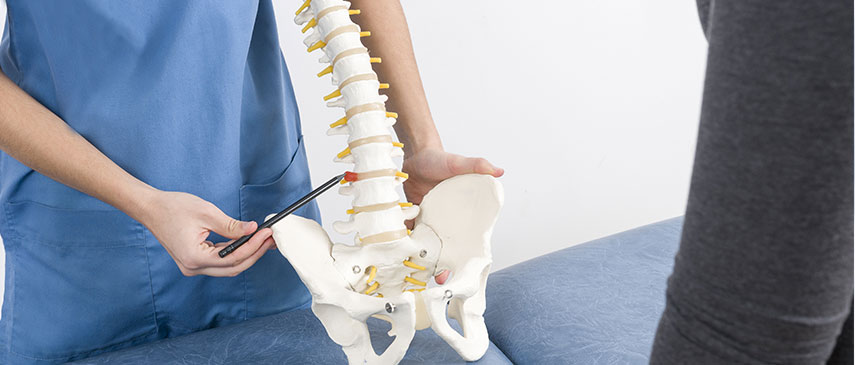Doing your daily workout. Preparing food for dinner. Playing with your grandkids. Back pain can make these — and many other — common daily tasks much harder to do.
Back pain can be caused by a variety of medical conditions. But in many cases, the back pain you feel could be caused by a herniated disc. Herniated discs can occur anywhere along the spine but typically affect the lower back area. It’s estimated that people between the ages of 25 and 55 have about a 95% chance of developing a herniated disc in their lower back. A physical therapist can help you learn more about this cause of back pain. They can also help you find effective treatment for it.
What is a herniated disc?
Spinal discs are soft and rubbery pads, designed to work as shock absorbers, located between the bony vertebrae that help make up the spinal column. Made of a thick outer ring of cartilage and an inner gel-like substance, spinal discs work to allow the back to bend with ease.
Additionally, your spinal column helps protect delicate nerves and your spinal cord. If the cartilage in your spinal disc somehow tears, the gel-like substance inside the disc can break through. This herniation can then put pressure on the nerves, resulting in intense pain. In fact, even small amounts of pressure on your spinal nerves can cause weakness, numbness, and back pain.
What causes herniated discs that lead to back pain?
The most common cause of herniated discs that trigger back pain is age-related water loss. Spinal discs are up to 80% water. When you’re young, your spinal discs have a high water content level. However, as you age, the water content in your spinal discs decreases. This causes the discs to become less pliable and increases the risk of tears or other defects.
Some of the other common causes of herniated discs include:
- Excessive body weight or obesity
- Traumatic injury
- High-impact sports
- Repetitive twisting movements (workplace injuries)
- Heavy or incorrect lifting
Common symptoms of a herniated disc
Symptoms associated with a herniated disc can vary depending on where the injured disc is located. Some of the most common symptoms this condition can cause when it occurs in the lower back include:
- Pain in the back when bending or twisting
- Burning, numbness, or tingling in the back, buttock, legs and/or feet
- Weakness in the legs
- Pain that intensifies when sitting, coughing, sneezing or bending
Peak Performance can treat herniated discs that cause lower back pain
Not sure if your back pain is being caused by a herniated disc? Our Peak Performance team can help you discover the true source of your pain. We offer free screenings that are specifically designed to reveal the root cause of back symptoms.
In addition, our physical therapists excel at creating personalized therapy plans intended to reduce your pain and increase spinal mobility. We can even help you get therapy from home thanks to the virtual therapy sessions we offer.
Contact us today for more information about our back pain treatment options or to schedule an initial appointment.
Tags: Peak


